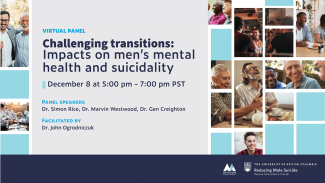
The UBC Reducing Male Suicide Research Excellence Cluster presented, Challenging transitions: Impacts on men's mental health and suicidality which took place on December 8 from 5:00 pm - 7:00 pm PST (Vancouver).
This virtual event featured a panel of experts in the field of men’s mental health and focussed on how challenging transitions impact men’s lives. Specifically, the panel explored how major life changes, such as fatherhood, retirement, divorce and COVID-19 can both challenge men’s mental health but also muster strategies for promoting men’s well-being.
Meet our facilitator
Dr. Ogrodniczuk is a Professor of Psychiatry and Director of the UBC Psychotherapy Program, and co-lead for the Reducing Male Suicide Research Excellence Cluster at UBC. His research program focuses on a variety of psychotherapies and patient populations, with a particular focus on personality disorders and men’s mental health. He is Past-President of the North American chapter of the International Society for Psychotherapy Research. Dr. Ogrodniczuk also maintains a private psychotherapy practice.
To learn more about Dr. Ogrodniczuk’s work, please visit the UBC Psychotherapy Program website.
Meet our panel speakers
Dr. Rice leads the Gender and Social Psychiatry Research Lab at the Orygen; Centre for Youth Mental Health at The University of Melbourne, where his work examines social influences on mental health outcomes, with a particular focus on young men’s mental health, athlete mental health, digital mental health interventions, and the treatment of moderate-severe mood disorders and suicide prevention in young people. Dr. Rice has previous experience in a range of acute and outpatient mental health settings, including a residential program for military veterans experiencing severe combat-related post-traumatic stress disorder and forensic mental health treatment within a men’s maximum security prison.
To learn more about Dr. Rice’s work, please visit the University of Melbourne website.
Dr. Creighton is the Manager of Knowledge Translation at the Michael Smith Foundation and is responsible for the implementation, monitoring and evaluation of the Foundation’s knowledge translation strategy. Her areas of expertise are in gender and health with a focus on the way that physical and social geographies have bearing on social construction of masculinities and gendered health practices. Dr. Creighton’s work focuses on creating innovative strategies for knowledge translation in the community to stimulate conversation and dialogue on the issue of youth suicide and depression.
To learn more about Dr. Creighton’s work visit the Michael Smith Foundation website.
Dr. Westwood is Professor Emeritus (Counselling Psychology) University of British Columbia. His major areas of teaching and research focused on development, teaching and delivery of group based approaches for counselling clients, trauma rehabilitation and men’s psychological health. He developed the UBC Veterans Transition Program (VTP) to help promote recovery from war related stress injuries.
To learn more about Dr. Westwood’s work visit the UBC Educational and Counselling Psychology website.